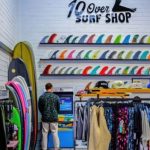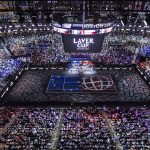Consumers again reined in spending during the five-week retail fiscal month of September as comparable store sales rose only slightly. Channel breakdowns showed a consumer trading down to find the best values possible.
Of the retailers tracked by Sports Executive Weekly, only three retailers outside of the warehouse club channel posted comp gains for the month: Wal-Mart, Aeropostale and The Buckle. Wal-Mart and Aeropostale both benefited from high-value, low-price business models. The Buckle is the lone wild card as it continues to throw strong monthly comps results up on the board.
Retail industry comparable store sales for the fiscal month increased 1.0% over the year-ago month, according to a tally of 36 retail chain stores compiled by the International Council of Shopping Centers. The September 2008 performance was the softest September since 2001 (+0.9%) in the aftermath of 9/11 and a recession.
Several retailers were impacted in part by the hurricanes that struck the Gulf Coast in the month as well as the ensuing gas shortages in the Southeast. Wal-Mart noted that it had 341 Wal-Mart division stores experience business interruption from the hurricanes. However, that distraction also had a plus, especially for the outdoor industry, as sales were boosted by emergency supply purchases. Stage Stores only had two stores not affected by one of the hurricanes.
However larger impact on the month by far was the general consumer anxiety around the credit crisis and ongoing troubles in the economy and Wall Street. For example, Gottschalks chairman and CEO opined that its exceedingly weak “sales for September reflect[ed] the persistent challenges in the macroeconomic environment, which intensified due to unprecedented and mounting events in the financial markets. In light of these events,” consumers continued to be very cautious in spending.
The best performing segments were the value and staples, which is a continuation of the underlying story.
Wholesale clubs had a collective increase of 7.4% in comp store sales versus the same period of the prior year, or up a solid 5.2% excluding fuel sales. Luxury stores posted the worst performance for the month.
Following the weak comps results a number of retailers either cut guidance or downgraded expectations to the low end of previously reported guidance. Included in that group were Ross Stores, Stage Stores, TJX Co., Pacific Sunwear, JC Penney, Nordstrom, Kohls and Target.
Those retailers run the gamut from high-end lux to mall specialty to discount, showing just how widespread the softness spread and just how uncertain retailers are of the coming months ahead.
Based on retail point of sale data compiled by SportScanINFO, the overall Sport Softgoods market saw slightly better growth, with sales growing approximately 1.6% in dollars. Units, however, were just below flat. Sport Apparel sales were relatively flat for the month, but Sport Footwear grew approximately 2.3% when measured in dollars. Both Sport Footwear and Sport Apparel were down less than 1% compared to the year-ago fiscal September when measured in units.
On a channel basis, full-line sporting goods was saved by stronger Sport Apparel sales that offset Sport Footwear sales that were just below flat. The opposite happened at mall specialty as marquee footwear helped to drive a low-singles increase in Sport Footwear sales that offset a high-singles decline in Sport Apparel for the channel.
By far the softest channel for Sport Softgoods for the month was mid-tier department stores where Sport Footwear sales declined mid-singles and Sport Apparel declined in the high-20s. In fact, excluding the mid-tier channel, Sport Softgoods sales would have increased in the mid-single-digits for fiscal September.
ICSC estimates that October comps will rise between 1.5% and 2.5% as an easy comp last year meets with continued difficulties in the broader economy.














